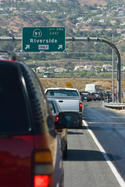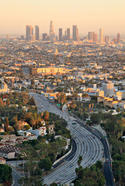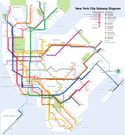The 2015 Tom Tom Traffic Index shows that Dallas-Fort Worth has the least overall congestion among world (urban areas) with more than 5,000,000 population. The Tom Tom Traffic Index for Dallas-Fort Worth is 17, which means that, on average, it takes 17 percent longer to travel in the urban area because of traffic congestion. read more »
Transportation
Best World Cities for Traffic: Dallas-Fort Worth, Kansas City, Indianapolis and Richmond
- Login to post comments
A 'Diet' to Give California Drivers Indigestion
In the past, it was other people’s governments that would seek to make your life more difficult. But increasingly in California, the most effective war being waged is one the state has aimed at ourselves. read more »
- Login to post comments
So Much for Peak Driving (VMT)
So much for peak VMT. The planners and analysts who watched vehicle miles traveled (VMT) trends seemingly peak are no doubt anxious as the preliminary 2015 VMT numbers produced by the U.S. Department of Transportation showed new record total VMT well ahead of the 2007 number that many had hoped signaled peak U.S. VMT. Perhaps even more disconcerting was the sharp increase in per capita VMT, up approximately 2.6 percent for 2015. read more »
- Login to post comments
New York's Incredible Subway
The New York subway is unlike any other transit system in the United States. This system extends for 230 miles (375 kilometers) with approximately 420 stations. It serves the four highly dense boroughs of the city (Manhattan, Brooklyn, Queens and the Bronx), each of which is 20 percent or more denser than any municipality large municipality in the United States or Canada. read more »
California’s High-Speed Rail Authority Wins Dishonor of the California Golden Fleece Award
The California High-Speed Rail Authority (CHSRA) has won the Independent Institute’s first California Golden Fleece Award for its lack of transparency and history of misleading the public about key details of the state’s “bullet-train” project, which no longer reflect what voters approved in 2008. read more »
- Login to post comments
Focus on Cost-Effective GHG Emissions: Report
The Reason Foundation has published my new research reviewing the potential for urban containment (or other restrictive policies that are sometimes called "smart growth") to reduce greenhouse gas (GHG) emissions. Principal reports cited by advocates of urban containment are reviewed. The conclusion is that only minimal reductions if the gains from improved automobile fuel economy are excluded. read more »
- Login to post comments
Public Transportation Ridership: Three Steps Forward, Two Steps Back?
The Bureau of Transportation Statistics recently released preliminary data summarizing public transportation ridership in the United States for the calendar year 2015. The preliminary data from the National Transit Data program showed transit ridership in 2015 of 10.4 billion annual riders approximately 2.5% below the 2014 count and also smaller than the 2013 count. read more »
- Login to post comments
America's Subway: America's Embarrassment?
Washington's Metro (subway), often called "America's subway," may well be America's embarrassment. As a feature article by Robert McCartney and Paul Duggan in the Washington Post put it: “'America’s subway,' which opened in 1976 to great acclaim — promoted as a marvel of modern transit technology and design — has been reduced to an embarrassment, scorned and ridiculed from station platforms to the halls of Congress. Balky and unreliable on its best days, and hazardous, even deadly, on its worst, Metrorail is in crisis, losing riders and revenue and exhausting public confidence." (emphasis by author.) read more »
- Login to post comments
A Commentary on the Notion of Extreme Commutes
A recent piece by Joe Cortright in the City Observatory touched on the often discussed issue of extreme commutes, a favored topic among reporters complaining about sprawl and traffic congestion. The notion of extreme commutes is obviously a fun topic. But it is one that is ripe for analysis based on travel time data that has been available through the Census since 1980 . read more »
- Login to post comments
Evolving California High Speed Rail Now Degraded To Only A Commuter Train
When voters passed in the November 2008 election, Prop 1A, they approved partially funding a 800 mile High Speed Rail project, that was to run from San Francisco to San Diego. The project was to be constructed quickly and be up and running by 2020.
Approved Business plans in 2012 and 2014, then projected construction to start from the Central Valley, near Fresno, and proceeding south through the Tehachapi Mountains to Los Angeles Union Station. read more »
- Login to post comments






















